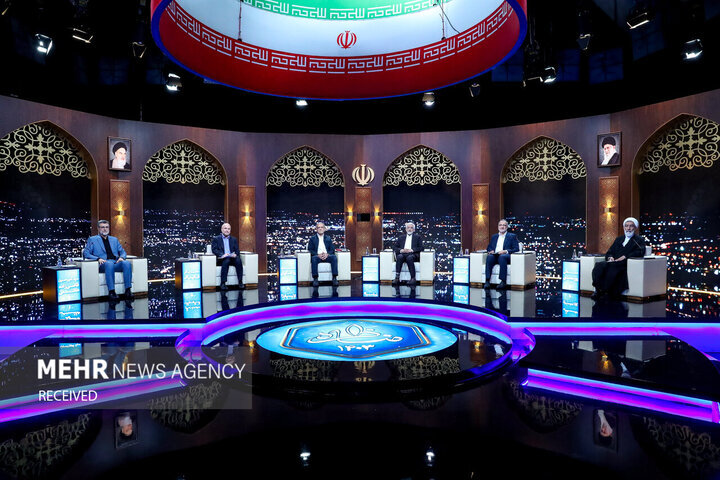Candidates talk economic policies in 2nd televised debate

TEHRAN – The six candidates running for president in the June 28 vote appeared on TV for the second time on Thursday to discuss their plans and policies for Iran’s economy, which has been under straddling pressure in the past few years due to U.S. sanctions.
Reformist candidate Masoud Pezeshkian fell short of providing concrete and detailed policy proposals, instead resorting to his previous refrain of "not being an economist" as an explanation for the lack of specifics.
He and conservative Alireza Zakani were locked in back-and-forth incendiary comments for most of the 4-hour debate.
Zakani, along with some other conservative candidates, claimed Pezeshkian is merely acting as the spokesperson of former president Hassan Rouhani, who has turned into a somewhat unpopular figure in Iran due to the collapse of the JCPOA and the economic consequences of the pact’s fall.
In his most controversial remarks, Pezeshkian claimed Iranian doctors who are among the best-paid workers in Iran and have a reputation for evading taxes “have the right” to do so, as they get paid “very little” for their consulting sessions with patients.
Social media users condemned Pezeshkian for “siding with the wealthy”, pointing out that the rest of the Iranian population making far less than the doctors are paying their taxes.
Concerns were raised about some candidates making unrealistic promises to woo voters. A prominent example was Mohammad Baqer Qalibaf, considered a frontrunner in the race. He pledged to provide newly married couples with 75-square-meter homes at no rent for an initial period, should he be elected president. This promise was met with skepticism by some, who questioned the feasibility of such a plan.
Qalibaf’s comments on the overhaul of Iran’s health and education sectors were received well by the viewers.
Another candidate to make unrealistic promises was Amir Hossein Qazizadeh Hashemi, who said he would make energy cheaper by giving each family a “subsidy card”. Energy products in Iran are already heavily subsidized and among the cheapest in the world. In fact, some economic experts have been pressuring authorities to raise the prices, especially for gas, which is currently sold at a cheaper price than bottled water.
Mostafa Pourmohammadi was also targeted by Zakani for his past actions and records. The moderate candidate was asked to clarify a notorious corruption case, which was swept under the rug during his tenure as the Minister of Justice.
The last conservative candidate’s remarks, Saeed Jalili, did not seem to trigger a point of contention during or after the debate.
